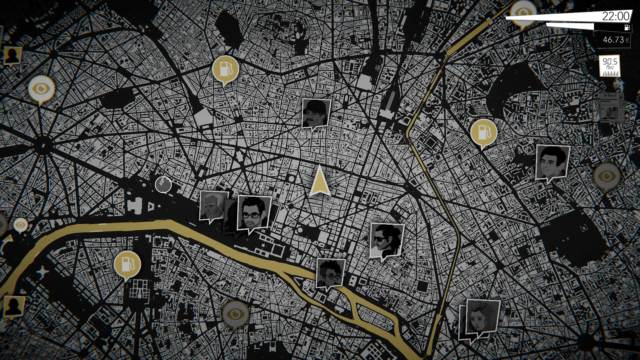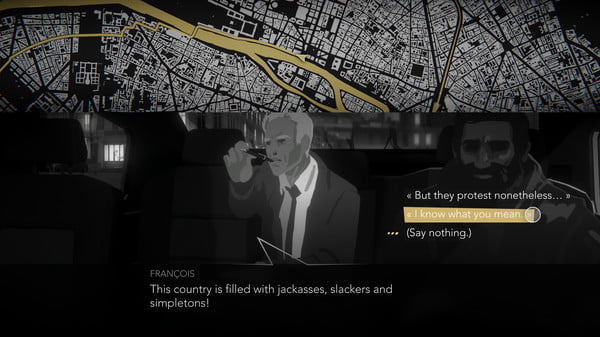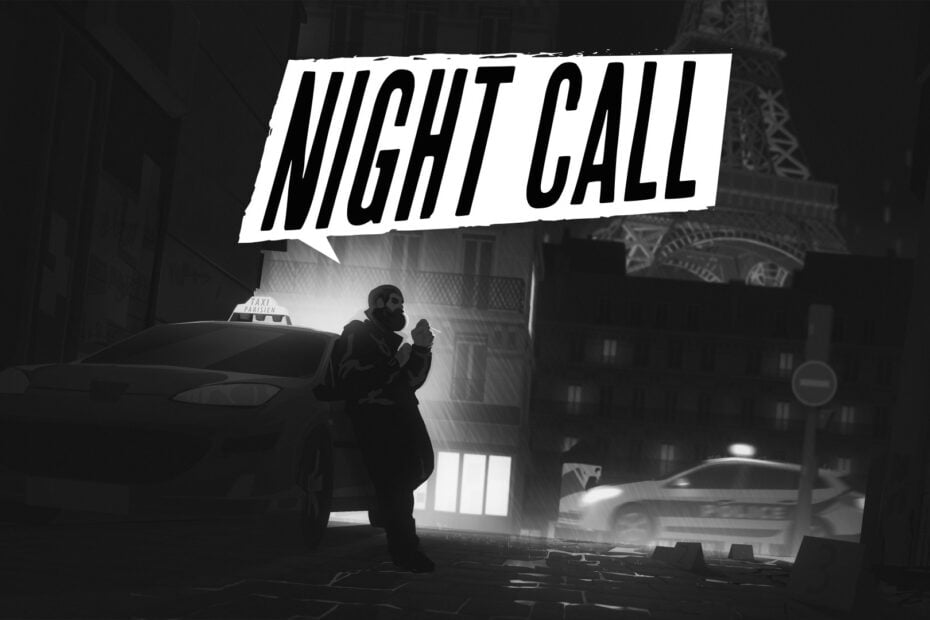Nightcall! What an iconic track, one which a year after its 2010 release would perfectly encapsulate an entire film: intrigue, mystique, elegance and unabashed badassery. Drive is a complex film in many ways, yet Kavinsky’s modern day classic seems to encase it all with ease. A song no longer than a few minutes, conveying so many different emotions and themes, it’s powerful stuff.
But this is Night Call, which through my rigid writing conventions must mean this has been a lazy bait and switch in a “clever” attempt to show how it’s the polar opposite: shallow, on the nose, sloppy. Well, rules exist to be broken, and Night Call is actually neither too intricate nor too vapid. It’s just right! Well, not really. I actually found it quite tedious and unfocussed, but it’s clear the game has heart and some of what it sets out to do it does so quite powerfully.
We’re in Paris, night time, yet the streets appear packed and people are in need of transport. We play a taxi driver, one with a devious history, one which the game keeps under wraps for later reveals and one which builds upon the games investigative themes. An unscrupulous copper jumps into our cab, armed with blackmail, and sets us on a mission to uncover the identity of the active, Parisian serial killer.
Despite the overt inquisitive nature to our task, Night Call is first and foremost a visual novel rather than a Phoenix Wright or Orwell. Most of your time is spent providing your transportation services to several characters, of which you get a choice of whom to take on a map, during which you chat to them, help them with their life woes and experience some concise, bespoke stories. Of the 70 or so potential customers, each case will have 5 of these as potential suspects, yet on your map a handful of the total potential NPC’s could show up at any time. Choosing which ones to interact with – along with managing your fuel and travelling to predetermined spots of interest in the search for information – is where the game’s “simulation” side manifests, but the game is predominantly dominated by the actual chatter.

I can’t say I’m the biggest fan of visual novels. Storydriven games are obviously appealing and visual novels have immense capacity for fantastic narratives, but even with those which lack complex mechanics such as Gone Home or We Become What We Behold, there needs to be something gameplay-wise to tie it all together. In those examples, Gone Home’s slow, brooding pace for collecting clues allows the story to climax wonderfully, while the latter experience takes a single gimmick and has it last mere minutes to drive a concise point home. I find the perpetual reading of visual novels far too similar to reading traditional novels, which I absolutely enjoy, but separate from my video games. Regardless, while Night Call heavily relies on reading strings of text, the constant swapping in and out of new, diverse characters keeps you from getting wholly tired, where some visual novels stick too closely to the literary format and feel just like books with a slideshow in the background.
It helps that Night Call utilises rather beautiful hand drawn art, even in the face of how ultimately gloomy and literally dark it is. Every scene is complemented by slightly animated frames of our protagonist nattering away with a customer. It errs on the side of looking stripped of detail, while still managing to convey the emotion of characters without needing to say so. This is of course (for anyone that’s seen anything about this game) matched with a noir style which doubles down on the moody aesthetic and obviously slots in nicely to the inquisitive nature to the games subject matter. It’s quite a worn aesthetic, but to echo my last review on Stubbs the Zombie, it’s similar to using “Lollipop” to evoke feelings of the 50’s; make something greyscale and I’ll visualise a fedora on my nog. It just works, and combined with the well done visuals, Night Call’s Paris fittingly feels full of despair and mischief.
I said Night Call leaned far heavier into the visual novel camp before, and despite the story revolving around solving a murder, the game lacks much genuine detective work. After a night shift in your trusty steed, one filled, hopefully, with intel gathering, you return to your apartment and piece together clues to determine who the killer is. I say “piece together”, but this is almost entirely an internal process as the game doesn’t have a structure to facilitate anything more than dragging pieces of text around and matching it to the suspect’s profile. Clues such as how tall the serial killer is to evidence found at the crime scene is made available to the player, but most of it is either red herrings or unrelated. I suppose the purpose is to have you figure out which pieces are intentionally misleading, but I found with the two cases I played, it was quite obvious which ones existed just to lead you astray. Furthermore, there’s something distinctly missing in the whole process. It’s somewhat linked to the information gathering aspect of the game, as what customers are available for probing is luck of the draw. Some suspects can have no clues linked to them at all, and in one case I played I only ever spoke to two of the suspects, yet still completed the case successfully.
Night Call feels like a game designed around being a taxi driver first, and being embroiled in crime came second. An afterthought, arguably, so you would hope the cab simulation side holds up. I’m of two minds with it to be honest. A firm belief people hold of taxi drivers is that they must hear some shit, relating to both interpretations of that word: complete bollocks yet also some real heavy stuff. In this way, Night Call manages to depict both scenarios pretty well. Due to the fairly expansive cast of characters, interactions with characters never feels stale in a way one would feel if you were talking to the same people over and over again. Additionally, the cast that does exist here doesn’t stop at vast, it’s actually quite varied and each character serves to explore different, individual narratives which don’t feel alike at all. Some of my favourite customers were the “peculiar” bunch, a word ripped straight from the track title which accompanies these passengers. A standout was a drunk dressed as Santa, shouting expletives and telling you he’s sick of spoiled kids at this time of year, having you drive to an approximate destination where his “reindeers” should be. It’s funny to start with, this “Bad Santa” type entering your car and interacting with you in a fashion antithetical to your expectations. It’s a trope, for sure, the intoxicated, bitter mall Santa, but it isn’t until halfway through your ride you realise this is the real deal, the genuine Father Christmas, in his true Belsnickel form.

None of this would be possible were the game written poorly. Night Call certainly isn’t, venturing into territories a lot of games wouldn’t dare touch, from the more widely recognised effects of depression, to more esoteric and niche issues like the feelings associated with disappointing your parents and feeling dispassionate with your work. The latter topic in particular interested me, an interaction you have with a famous 2 star (now 1 star) Chef whereby she elucidates how her hobby has been ultimately tarnished by something as meaningless as a rating. It’s something you see real world chefs do all the time, a pursuit which ultimately always tends to destroy them as they face a practically unattainable goal. If you poke and prod her, you can discover she still loves cooking and despite the recent misfortune of losing a star (which leads to her restaurant’s demise), she will find happiness by cooking for herself rather than other people again. It’s an easily translatable mantra: Once you turn a hobby into a profession, it ceases to be an enjoyable pastime.
Interactions like this exist readily throughout the game, but searching for ones which hit me personally as hard as that example weren’t as fruitful as I would have hoped. To reiterate, Night Call is not poorly written, yet I found myself getting quite bored with over half of my interactions with characters due to how their individual stories didn’t seem to matter, both in relation to the game’s plot and also to my own interests. In fact, I think a lot of my dissatisfaction with the game stems from how unrelated each story is. Playing Night Call’s story mode feels like an exercise in patience sometimes, as the core case feels like something happening in the background whilst you talk to people with problems you just don’t care about. The authentic taxi driver experience, I imagine, but not too interesting as a game. With the large cast it has, despite their individualism, they fail to converge into anything at all, feeling like loose threads from diametrically opposed pieces of string. A different mode, “free roam”, also exists, and skipping the unnecessary explanation I feel this is less like a solution than it is a means of giving players that do enjoy the conversations an easier and more direct way of experiencing them. As the game stands, I would have liked to see it delve deeper into the investigation side of the game, letting you choose what subjects you talk about with passengers, build relationships with them and have them divulge information on the case. As is, Night Call is 80% extraneous dialogue and 20% relevant conversations lacking the mechanical depth to add something extra to the traditional visual novel format.
As an offshoot, I want to mention how impressed I was with the game’s soundtrack, not only in an isolated listening environment but the way each track manages to convey the exact tone needed for specific scenes. 37 tracks long, Corentin Brasart’s charged ambient work effectively changes depending on the current scenario. I previously alluded to “A Peculiar Character”, a song which oscillates in a fashion with such playful mischief I couldn’t help but smile as it bounced around my head alongside a journey I had chatting like a madman with a cat. “A Killer in Your Car” felt highly reminiscent of a song that plays in Denis Villeneuve’s “Sicario”, during a scene in which tensions gradually escalate as the CIA look to neutralise gang members on a jammed freeway. The piece in Night Call self evidently plays during one case where the killer clocks the fact you’ve discovered their sinful secret, and the song booms and screeches as you’re uncertain whether they’ll add you to their list of victims. As a broader score, it manages to set moods in a way I can’t imagine would be nearly as effective with a subpar replacement, and despite prior praise for the remarkable visual direction, the soundtrack will be the thing I will remember most about the game.
So where does that leave me with my overall opinion on the game? I’m not sure myself. When I look back on the games I enjoy, I’ve finished them all. That’s not a surprising statement, but when it comes to Night Call, I didn’t complete the last case out of a form of lethargy at the thought of playing it. Despite being well rounded in plenty of ways, from its bespoke characters to the stellar presentation values, I can’t help but feel put off slugging through some of the conversations when I know they don’t pertain to the case at hand. I wish Night Call was something else, I think, something which tried to balance detective work with standard text based storytelling with more equal footing. Night Call doesn’t feel focussed in that regard. It wants to be filled with intrigue and secrecy, but doesn’t commit to it enough, instead hoping the shorter narratives are enough to keep you entertained. It ultimately didn’t in my case, but for some it might. Different strokes for different blokes, I guess.

